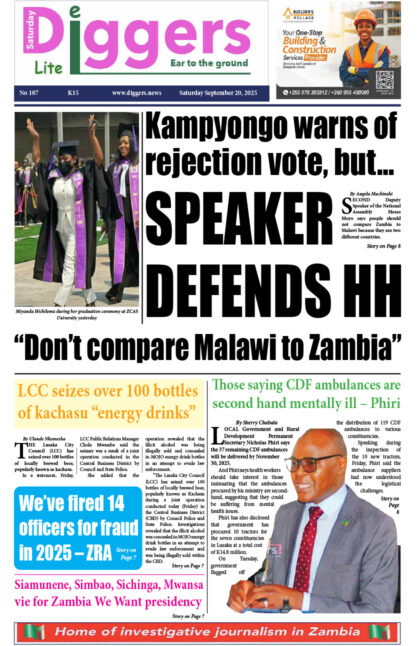A lot has been said about this case. I will try to make it as plain simple as possible.
Magistrate Benjamin Mwelwa was hearing a criminal case. The parties were as follows: The People (represented by prosecutors from the Anti-Corruption Commission and the DPP), and the accused (represented by lawyers). In Zambia and elsewhere in the common law systems, lawyers are not parties to a matter. Lawyers are advocates for the parties. Magistrates and judges (the bench) in most circumstances know each other, could drink kachasu together, went to school together and they could be personal friends. There is no system in the common law world where a judge must recuse themselves because a lawyer is personally known to them. Lawyers are not parties to a matter. They are advocates.
In a criminal matter before a magistrate: both the state and the accused are equal before the court. The magistrate even if they are employees of the state (the judiciary), they are not under the auspices of the state (as prosecutors). Prosecutors should not think that they have a better status before a magistrate. The magistrate court is independent and does not do the bidding of the state as a matter of administrative convenience. The state must present their case before the magistrate and the magistrate is expected to make rulings according to the law and fact- both preliminary and substantive as the matter is ongoing.
In this case, the state appeared before the magistrate and they had a nolle prosequi to enter. I have no space to outline how nolles have become contentious in Zambia! The defendants in this matter contested the nolle. Good for them! They argued some novel point of law. Their argument was that under the new Constitution 2016, the DPP can’t just ambush parties in a criminal matter with a nolle. The DPP must provide reasons for their nolle, they argued. Magistrate Mwelwa heard both sides and realized that he could not answer the Constitutional question. Apparently in Zambia, when a magistrate determines that there is a constitutional question to be addressed, they must refer the matter to the Constitutional Court. That is exactly what Magistrate Mwelwa did. Who would fault him? I would do exactly that. He referred the question of the DPP’s nolle powers in view of Constitution 2016 to the Constitutional Court for determination.
Apparently, this irked the state’s prosecutors. They protested that the power of the DPP to enter a nolle is sacrosanct. However, instead of appealing that ruling; they instead complained to Magistrate Mwelwa’s administrative bosses! Here is the huge problem. State prosecutors should never be given this much power or right to complain against adjudicators in this manner. The ACC prosecutors complained that the magistrate should have entered the nolle without question. But as explained above, the magistrate had conflicting interpretations of Constitution 2016 before him. On one hand, the state said “we have the DPP’s nolle, accept it,” on the other hand, the accused said, “no way, there is a new constitution that has curtailed the DPP’s powers.” Magistrate Mwelwa acted very reasonably to refer this question to the Constitutional Court.
Suspension! After the prosecutors complained to the management of the judiciary, we are not sure if it was the Chief Justice they complained to or if it is Registrar Honourable Charles Kafunda. But anyway someone decided to write this magistrate and suspend him. Among reasons for suspension? Referring this question to the Constitutional Court for determination. This is not how the judiciary should be handling matters. The management should have made it clear to the state that they can either appeal Mwelwa’s ruling, or they should complain to the Judicial Service Commission or something like that. Parties to a matter should not be given the rights to circumvent judicial decisions by administrative actions. What the state failed before Mwelwa they could not achieve through the back door.
Magistrates should not fear administrative retaliation for judicial decisions. There must be a clear distinction drawn here. The fact that the ACC or the prosecutors have access to management in the judiciary should not be used to blackmail magistrates. Magistrates are particularly vulnerable because they do not have as much protection as enjoyed by judges of the superior courts. There was no way judiciary management was going to pull the same nonsense had this issue involved a High Court judge or a judge of a superior court. If you cannot have respect for small magistrates, you cannot have respect for the big fishes. Zambians cannot stand by while the judiciary erodes itself in their eyes.
The question that Magistrate Mwelwa had taken to the Constitutional Court has been addressed by the court. In fact, the Constitutional Court judges agreed with magistrate Mwelwa by holding that the question was properly before them and it was an important constitutional question. The majority in this ruling disagreed with the accused and upheld the state’s position that the DPP’s powers to enter a nolle cannot be challenged. The dissenting opinion of Judge Munalula is an opinion of the future. We will look at what Munalula said in her ruling later. But Judge Munalula ni nshimbi. No Size! (I am trying to be colloquial here).
The management of the judiciary now is coming up with fresh and new reasons why the suspension of the magistrate must be upheld. What is fundamentally offensive to constitutional order is the ambivalence that the judiciary management has towards the rule of law. Suspending a magistrate because the ACC has complained after losing a point of law they were arguing makes no sense! It is not right. It is tyranny.
We now understand that the Attorney General is the one to respond to any future challenge of Mr. Kafunda’s illegal letter. Public officers in Zambia, like the Chief Justice and the Registrar of the Judiciary, can do all they can, mess up and leave it all to the Attorney General to clean up and face questions. This particular mess is so important to our constitutional structure and we hope to litigate it before the courts, before the public, and before the politicians. We will not relent.
We are not trying to defend an incompetent magistrate. If Mwelwa is incompetent the Judicial Service Commission must provide reasons to fire him. But it is not incompetence to refer a question to the Constitutional Court for determination. Actually, it is incompetence for the judiciary to get a complaint from a losing litigant and use that to suspend a magistrate!
For now, we end here and we call upon all Zambians concerned about common sense and the rule of law to make it very clear to the judiciary. We support the judiciary. We support superior judges. But we also support small judges, the little magistrates out there who are doing all they can to keep the judiciary going. If we demoralize magistrates, there will not be any rule of law to uphold in Zambia. Magistrates are all over the nation, hearing matters every day. They are working in very difficult conditions and they do not have as much protection as the big fishes. Magistrates do not have to worry about what Honourable Kafunda thinks about their rulings. Mr. Kafunda’s duties are to provide magistrates with pens, pencils, clerks, benches and several utensils they need to serve our country.
As a side note, Chief Justice Mambilima must know that we are her partners in ensuring that our courts are independent. If she wants to continue being our partner, she is welcome to, but if she continues tolerating illegal acts from her management, the people of Zambia will make it very clear that our courts are sacred and we will defend them!
























